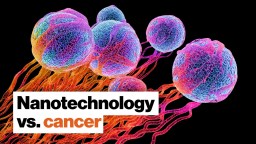cancer
How many other disease-fighting compounds might we find in the ocean?
Scientists continue to learn more about this class of plant chemicals that’s known to have extraordinary health benefits.
Compared to traditional cigarettes, e-cigarettes are extremely understudied. There is, however, some evidence on their negative effects on your health.
Cancer’s sweet tooth. Turning cancer cells into fat. Unveiling genetic secrets. Scientists are learning about cancer every day.
Meet Deinococcus radioduranst, the world’s toughest bacteria.
A new study found a positive association between sugary drinks and cancer.
Future cancer research may come from studying antler growth.
Does wishing someone well actually affect their health?
New technology could predict cancer up to 5 years in advance.
We may be able to detect cancer soon by simply peeing on a stick.
▸
8 min
—
with
Two new studies might have identified whether or not patients will respond to chemotherapy.
Vitamins do work — when eaten in whole foods, not pills.
“We inject one tumor and we see all of the other tumors just melt away.”
Devil facial tumor disease, or DFTD, has cut the Tasmanian devil population by 90 percent. Now, some devils have evolved to resist the virulent cancer.
A new study has some disturbing implications for rodents who like a nice soda.
The controversial herbicide is everywhere, apparently.
Can learning about the great white shark help protect us from cancer?
Can the keto diet really help people combat acne, cancer and “brain fog”?
Antibiotics or anti-inflammatory drugs may help combat lung cancer.
Chemo is our best response to cancer so far. A novel new therapy could render it obsolete.
Can changing diet actually reverse the growth of cancer in the body?
Researchers at the University of Basel in Switzerland have hijacked cancer’s cellular plasticity to turn the disease against itself.
Folios cheese wraps can be a surprisingly healthy substitute for traditional tortillas. Of course, there’s a catch.
Donating to the right charities can save lives.
The damage might not be “as bad” as traditional cigarettes, but it’s still pretty bad.
Why? Because you have more cells, the researchers say.
A French study of nearly 70,000 people yielded startling results for two forms of cancer.
Anatomy and physiology professor David Harper claims a recent study in The Lancet is flawed.





























